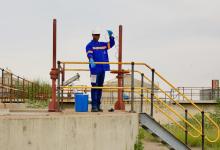Strengthening Polio Surveillance: Risk Assessment following Detection of Circulating Vaccine Derived Poliovirus type 2
Environmental Surveillance (ES) was introduced in August 2022 to complement case-based AFP surveillance. The first established site for ES was Gaborone, Glen Valley Wastewater Treatment Site. Through this surveillance, the circulating Vaccine Derived Poliovirus type 2 (cVDPV2) was detected on October 4, 2022. Following the country risk assessment, a recommendation was made to conduct a nationwide vaccination campaign using the novel polio type 2 polio vaccine (nOPV2) for all children under the age of 7. Since then, seven more ES sites have since been established in Botswana. The last detection of VDPV from these sites was in July 2023. However, a vaccine-derived poliovirus type 2 (VDPV2) was recently detected in a sewage sample collected from the Glen Valley Wastewater Treatment Plant on July 2, 2024.
In response to this detection, Ministry of Health, in partnership with WHO, launched an extensive house-to-house investigation in Gaborone, Ramotswa, and Molepolole from August 19-23, 2024. This proactive initiative targeted 10,000 households to intensify polio surveillance and promote vaccination awareness, emphasizing Botswana's dedication to health security and polio eradication. The fieldwork included active search for AFP Cases in households and screening of under 5 child welfare cards for missed opportunities for zero doses. The fieldwork started with engagement of community leaders including village chiefs and other community leaders. These leaders played a pivotal role in mobilizing community members to engage fully in the investigation. Through door-to-door visits, teams delivered essential health messages about hygiene practices, such as handwashing and safe food preparation. Emphasis was also made on the importance of immunizations to prevent childhood illnesses. These sessions raised awareness about how simple preventive measures can guard against poliovirus and other infections, fostering a stronger health-conscious community. Community field teams, composed of local health volunteers and supervisors, screened over 14,905 children under 15 years across targeted regions.
Five (5) AFP alerts were raised, none were confirmed as polio, highlighting both the vigilance of the teams and the success of Botswana's ongoing immunization programs. One of the key objectives was to review vaccination coverage among children under five, revealing a high immunization rate of 90.2% fully vaccinated, with only a small fraction partially or not vaccinated. However, gaps identified among specific groups highlight areas for targeted vaccination outreach. Complementing the community search, an integrated supportive supervision (ISS) was conducted in priority healthcare sites across the target districts. Supervision teams assessed local healthcare workers' knowledge and practices regarding AFP case definitions and surveillance procedures. Clinicians received additional training on detecting and reporting AFP cases, while facilities were equipped with feedback to strengthen their surveillance capacity. This investigation is a testament to Botswana’s ongoing commitment to upholding high standards in vaccine preventable disease surveillance.


